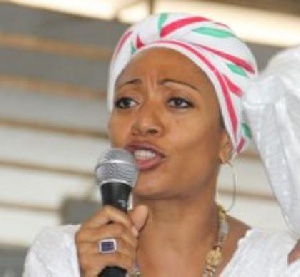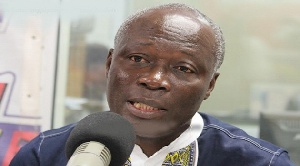The chairperson of the Convention People’s Party has challenged the government to raise the standard of living of the ordinary Ghanaian by adopting prudent economic policies and rejecting policies that over-emphasise fiscal austerity as a means of inflation control.
In what can be described as a comprehensive policy statement of the CPP on the economy delivered at a meeting with executives of the Trades Union Congress, Ms Samia Nkrumah lashed out at successive NDC and NPP economic policies and said they had failed to deliver the promised economic benefits.
“The failure of fiscal austerity measures to control inflation for the past 32 years has been experienced by all of us,” she said, and added that it is time for the country to “reject fiscal austerity as the policy to control inflation in the long-term”.
“This is because the trade and budget deficits do not by themselves cause inflation. The underlying cause of inflation in our economy is low productivity in agri-business and shortfalls in export earnings. It is these that cause the deficits in the first place,” the CPP Chairperson explained.
She argued that the country’s development partners, who prescribed for Ghanaians the policy of fiscal austerity and a focus on inflation control as our growth strategy, pay primary attention to employment creation in their economic development management strategy.
“They know that inflation is not a necessary consequence of employment creation -- and that in the short- to medium-term a certain rate of inflation should or can be tolerated for employment creation.
“As we speak, Mr. Bernanke, Head of the Federal Reserve Bank of the United States of America, is pouring easy money, referred to as quantitative easing (QE), into the American economy until the unemployment rate reduces to an acceptable level. He does not anticipate an unmanageable inflation rate as an outcome of his policy,” she stated. She said, employment creation should instead be the country’s foremost growth and development strategy, and indicated that the reason for such a strategy is simple to decipher: “Our people can afford to live with rising prices but cannot afford not to have incomes. What our people say in support of this practical experience and wisdom is that ‘enyekoraaente se pay day’”.
According to Ms Nkrumah, the country’s trade liberalisation policy restrains the growth of the manufacturing and agricultural sectors and is, therefore, the major cause of unemployment in the economy.
“The policy makes us dependent on imports and it is largely the cause of our trade deficit and pressure on the value of our currency and exchange rate.
“Our government is compelled to borrow from international financial markets to support a largely consumptive national budget, and intervene in the foreign exchange market to support the value of our currency and maintain an exchange rate that becomes increasingly unsustainable,” she added.
She said countries that choose to allow their currency to drop so that they can remain competitive, retain the capability to sustain and expand production capacity and increase export earnings in an effort to close or erase the deficit,
She added that the strategy of NDC and NPP governments has been to borrow to support the exchange rate and a largely consumptive national budget, and top it up with a cut-back in growth expenditure to bridge the deficit.
“This policy contracts the economy and just postpones the day of reckoning of an economic, financial and political tsunami if and when our creditors refuse to lend to us or give us aid that will be inadequate in any way by any measure,” she warned.
She said the important question is why Ghanaian governments choose social protection expenditure cut-backs and borrow to support the falling cedi when they have the option to maintain a realistic exchange rate that truly mirrors the country’s economic performance, enables domestic production to compete with imports and is generally consistent with the country’s development objectives.
According to her, unlike the NPP and NDC, the CPP does not accept that the Structural Adjustment development policy of stabilise, privatise, and liberalise is a growth and development formula. “They are also in our view not an end in themselves. They are means to an end that must be guided by inclusiveness, experimentation, common-sense and pragmatism,” she added.
Business News of Tuesday, 24 September 2013
Source: B&FT
CPP calls for radical economic reforms
Entertainment
















